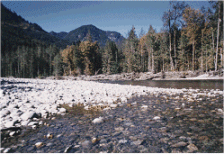Forest practices

- Forest practices permit
- Forest Practice Development Moratorium
- Conversion Option Harvest Plan
- Class IV-General Forest Practices
Forest practices are defined broadly as "any activity conducted on or directly pertaining to forest land and relating to growing, harvesting or processing timber…" See 76.09.020(10)* of the Revised Code of Washington* (RCW).
The Forest Practices Act (FPA), RCW 76.09*, governs all forest practices on non-federal lands that are conducted within Washington State though not all forest practices are regulated by the state. For permitting information, refer to forest practices permit.
There are four classes of forest practice:
- Class I forest practices are "minimal or specific forest practices that have no direct potential for damaging a public resource." They include such things as the growing and harvesting of Christmas trees, tree planting and seeding, cutting and/or removal of less than 5000 board feet of timber for personal use (see RCW 76.09.050(1)*; WAC 222-16-050(3)(a-s)*).
- Class II forest practices are those "which have a less than ordinary potential for damaging a public resource" and include salvage of logging residue and construction of 600 feet or more of road.
Class II forest practices do not include forest practices (1) on lands platted after January 1, 1960, (2) on lands that have or are being converted to another use, (3) which require a hydraulic project approval (HPA) from Washington Department of Fish and Wildlife, (4) are within "shorelines of the state" as defined in RCW 90.58.030* or (5) are on lands located within the Urban Growth Area of any jurisdiction (see RCW 76.09.050(1)*).
- Class III forest practices include forest practices that require an HPA, are within Shorelines of the state, involve any filling of wetlands and are not otherwise classified as a Class I, II or IV forest practice.
- Class IV forest practices have been defined by the Forest Practices Board to be either general or special.
- Class IV-Special forest practices have the potential to cause a substantial impact on the environment. They include certain aerial application of pesticides, ground application of pesticides within a Type A or B wetland, forest practices on lands designated critical habitat of state listed threatened or endangered species, and certain harvest activities within geologically unstable areas.
- Class IV-General forest practices are forest practices on (1) lands platted after January 1, 1960, (2) lands that have or are being converted to another use or (3) forest practices which would otherwise be Class III but which are taking place on lands which are not to be reforested because of likelihood of future conversion to urban development. Class I and Class II forest practices located within the UGA are, by definition, Class IV-General (see RCW 76.09.050*).
Until recently, all forest practices on non-federal lands were regulated by the Washington State Department of Natural Resources (DNR). In 1997, the FPA was amended giving authority to each city and county to exercise jurisdiction over all Class IV-General forest practices.
On August 10, 1999, DNR transferred the administration and enforcement of Class IV-General forest practices conducted within unincorporated King County to King County. DNR retained jurisdiction over Class I and II forest practices outside of the Urban Growth Area and over Class III and IV-Special forest practices.
Class IV-General forest practice permits are administered by King County through the Department of Development and Environmental Services. This permit is often approved as an adjunct to another development permit such as a building permit or residential subdivision and in this circumstance would not require filing a separate application. If no other development is being proposed, a separate application for the Class IV forest practice would have to be filed with the department.
Additional information on the forest practice rules and regulations and permits and/or approvals for forest practices over which the Forest Practices Board and DNR have retained jurisdiction is available through the DNR Web page www.dnr.wa.gov/forest practices* or through the DNR regional offices. Most of King County is included in the South Puget Sound Region* located in Enumclaw. Their office number is 360-825-1631; e-mail is southpuget.region@wadnr.gov.
Lands on which forest practices are performed under DNR approved permits are automatically subject to a six year development moratorium. For six years from the date of forest practice approval, King County will not accept any permit applications for any development activities that are not related to long-term forest management on these properties.
In some cases, where a forest practice was fraudulently obtained or other special circumstances exist, a landowner may request relief from the development moratorium. King County has several programs available that would enable a landowner to obtain a state approved forest practice permit and still preserve the right to develop all or portions of the property without being encumbered by the six year development moratorium.
Conversion Option Harvest Plans (COHP) are voluntary timber harvesting plans developed by landowners and approved by King County DDES. COHPs are typically developed for lands that may be logged as a Class II or III forest practice but the landowner is uncertain on what they intend to do with the property and do not want to be encumbered with the six-year development moratorium.
Landowners that do not qualify for COHPs may obtain partial relief from the six-year development moratorium by developing a long-term forest management plan and applying for a Class IV-General nonconversion permit.
*external link

